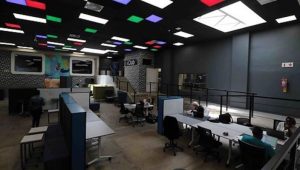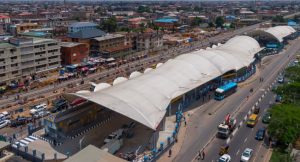
As Nigeria’s tech ecosystem continues to flourish, smart real estate investors are focusing on the commercial properties surrounding these innovation centers. From Lagos to Abuja and beyond, tech hubs are reshaping Nigeria’s commercial real estate landscape, creating lucrative opportunities for investors who understand this emerging market.
The Rise of Nigerian Tech Hubs

Nigeria has firmly established itself as Africa’s leading tech destination, attracting over $1.2 billion in funding in recent years.
This growth has created a ripple effect in commercial real estate markets across several cities like Lagos, Abuja, Ibadan and Port Harcourt,
Understanding Commercial Real Estate in Nigeria
Commercial real estate in Nigeria includes properties used for business purposes—such as office spaces, retail buildings, hotels, warehouses, and mixed-use developments.
Historically, Lagos and Abuja have led the market due to their roles as commercial and political capitals. But until recently, much of the commercial real estate focus was on banking halls, government offices, warehouses, and retail malls.
That’s changing!
The digital economy is introducing a new kind of tenant which are tech companies, startups, remote workspaces, coworking operators, and innovation clusters. These tenants aren’t just looking for buildings; they want smart infrastructure, flexible layouts, high-speed connectivity, and proximity to talent.
Why Tech Growth Is Reshaping the Real Estate Market
The rapid expansion of Nigeria’s tech sector is now one of the biggest drivers of commercial real estate demand.
In Lagos, areas like Yaba and Lekki have become magnets for tech startups and incubators. In Abuja, policy-driven innovation centers and digital training hubs are growing fast.
Even cities like Ibadan are catching investor attention due to their emerging developer scene and lower cost of entry.
Startups that began in coffee shops or co-working spaces are scaling fast and now need proper office space.
Venture-backed firms are hiring, hosting clients, building teams, and expanding operations—all of which require commercial property.
At the same time, the growing popularity of hybrid and remote work models is fueling interest in coworking hubs, especially those located near universities, tech communities, or transport corridors.
With the right location and setup, a well-positioned commercial property can generate consistent rental income while gaining long-term value.
The Top Tech Hubs Driving Commercial Real Estate Demand In Nigeria
Lagos

Lagos remains the commercial heart of Nigeria, and now it’s also the tech capital. In Yaba, often referred to as Nigeria’s Silicon Valley, you’ll find tech giants like Omnibiz ,Gokada alongside dozens of startups and accelerators. The demand for flexible, modern office space here is intense.
Lekki is another hotspot, offering a blend of high-end residential and commercial development. Tech companies like Flutterwave ,Bamboo, 54 Genes e.t.c are located in these areas. With better roads, proximity to the Lekki Free Trade Zone, and infrastructure improvements, it’s a magnet for both local tech firms and foreign businesses setting up a West African base.
Ikeja too is a well known tech hub in Nigeria.
Abuja

As Nigeria’s capital, Abuja has always been a political powerhouse of Nigeria. But now it’s also drawing attention from tech founders focused on, and policy innovation. The city offers cheaper land and more planned layouts compared to Lagos, making it ideal for tech parks, training centers, and government-partnered commercial developments.
Jabi, Wuse II, and Maitama districts are becoming hotspots for tech companies seeking proximity to government offices.
Ibadan

Often overlooked, Ibadan is quietly becoming a tech and commercial real estate gem. It boasts strong educational institutions, a growing youth population, and significantly lower real estate costs. For early-stage investors, this city presents an attractive option to buy low and benefit from long-term appreciation.
Port Harcourt
The oil city is witnessing growth in energy tech startups, creating specific commercial real estate needs:
- Industrial-Commercial Hybrid Spaces: Properties that combine office space with light industrial capabilities are in high demand.
- Waterfront Premium: Tech companies in the energy sector often prefer locations with access to port facilities, creating a niche market for waterfront commercial properties.
Read Also: Where to Invest in Lagos Real Estate: Prime Locations for 2025
Investment Strategies for Tech Hub Real Estate
- Co-Working Space Development
The flexible workspace model continues to thrive in Nigerian tech hubs:
- Average Returns: Well-managed co-working spaces in prime tech hub locations can achieve 12-18% annual returns.
- Success Factors: High-speed internet, reliable power solutions, and community-building amenities are non-negotiable features.
- Emerging Model: “Co-working plus” spaces that include specialized facilities like hardware labs, recording studios, or small-scale manufacturing capabilities command premium rates.
- Mixed-Use Developments
Tech professionals increasingly prefer living close to work, creating opportunities for integrated developments:
- Live-Work-Play Concept: Properties combining commercial space, residential units, and lifestyle amenities are seeing strong demand in Lagos and Abuja.
- Retention Rates: Commercial spaces in mixed-use developments report 22% higher tenant retention rates than standalone office buildings.
- Investment Scale: While requiring larger capital outlay, these developments offer diversified income streams and reduced vacancy risk.
- Specialized Infrastructure Properties
Tech companies require specific infrastructure that traditional commercial spaces often lack:
- Data Center Adjacent Properties: Commercial spaces near data centers can command premium rents from tech companies requiring ultra-low latency connections.
- Power-Resilient Buildings: Properties with advanced power solutions (solar + battery + generator systems) attract premium tenants willing to pay 15-25% above market rates.
- Connectivity Hubs: Buildings on major fiber routes with multiple provider options have significantly lower vacancy rate.
Related: The Ultimate Guide to Investing in Nigerias: Real Estate in 2025
What Investors Should Know Before Entering the Market
Like any growing market, Nigeria’s commercial real estate space comes with opportunities and challenges.
Investors need to conduct thorough due diligence by checking land titles, verifying permits, and partnering with trusted legal and real estate professionals. Infrastructure gaps (like power and roads) can impact rental yield, but in prime tech locations, returns are still very attractive—especially with long-term leases to VC-backed startups or co-working brands.
The smart money is looking at mixed-use developments that blend residential, commercial, and lifestyle amenities ideal for tech founders and employees who want everything within reach.
Final Thoughts
The intersection of Nigeria’s tech boom and commercial real estate expansion is one of the country’s most exciting opportunities in 2025. As startups continue to scale and digital infrastructure improves, demand for quality office and innovation spaces will only grow.
Whether you’re a local developer, foreign investor, or entrepreneur exploring Nigeria’s fast-growing tech cities, now is the time to explore commercial property opportunities—before the market becomes saturated and prices skyrocket.
Are you considering investing in commercial real estate in Nigeria’s tech hubs? At Thinkmint Nigeria, we have a variety of properties located in major tech hubs across Nigeria.
To check out our available listings, visit: www.thinkmint.ng/buy-realestate